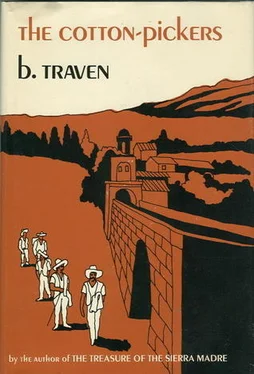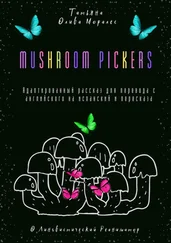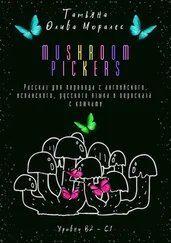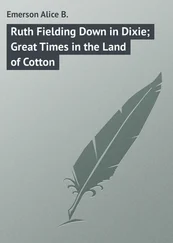B. Traven - The Cotton-Pickers
Здесь есть возможность читать онлайн «B. Traven - The Cotton-Pickers» весь текст электронной книги совершенно бесплатно (целиком полную версию без сокращений). В некоторых случаях можно слушать аудио, скачать через торрент в формате fb2 и присутствует краткое содержание. Год выпуска: 1969, Издательство: Hill and Wang, Жанр: Проза, на английском языке. Описание произведения, (предисловие) а так же отзывы посетителей доступны на портале библиотеки ЛибКат.
- Название:The Cotton-Pickers
- Автор:
- Издательство:Hill and Wang
- Жанр:
- Год:1969
- ISBN:нет данных
- Рейтинг книги:3 / 5. Голосов: 1
-
Избранное:Добавить в избранное
- Отзывы:
-
Ваша оценка:
- 60
- 1
- 2
- 3
- 4
- 5
The Cotton-Pickers: краткое содержание, описание и аннотация
Предлагаем к чтению аннотацию, описание, краткое содержание или предисловие (зависит от того, что написал сам автор книги «The Cotton-Pickers»). Если вы не нашли необходимую информацию о книге — напишите в комментариях, мы постараемся отыскать её.
—Book World
The Cotton-Pickers — читать онлайн бесплатно полную книгу (весь текст) целиком
Ниже представлен текст книги, разбитый по страницам. Система сохранения места последней прочитанной страницы, позволяет с удобством читать онлайн бесплатно книгу «The Cotton-Pickers», без необходимости каждый раз заново искать на чём Вы остановились. Поставьте закладку, и сможете в любой момент перейти на страницу, на которой закончили чтение.
Интервал:
Закладка:
But his warm breath was truth, his groping, clawing fingers were truth. All the rest was footlights.
An Indian laborer was sitting on a bench near us, ragged like tens of thousands of others of his class because their wages are barely sufficient to pay for their food. It often happened that such a laborer had nothing left over for a thirty-centavo bunk in one of the many flophouses — dormitorios, they’re called — where in the morning fifty or eighty or a hundred bedfellows of every race and every nation, afflicted with every disease in the medical dictionary as well as others that no doctor had heard about as yet, all washed in the same bowl, all dried themselves on the same towel, and combed themselves with the same comb.
The Indian had fallen asleep on the bench. His limbs sagged and his overworked, exhausted body was crumpled into a heap of rags.
At this moment a policeman came sneaking up. He circled the bench, his eyes glued on the man sleeping there. Then, when he was again behind the bench, he raised his leather whip and brought it down hard and pitilessly on the shoulder of the sleeping man, at the same time yelling at him: “You bum, you, get up, out of here or I’ll turn you in! The law prohibits sleeping in the park and you know it. Get going before I get seriously rough with you.”
With a suppressed groan the Indian plunged forward as if a sword had slashed into him. Then his body jerked upward again and, writhing and moaning, he felt for his tortured shoulder. The policeman now stepped in front of him and grinned maliciously. Great tears of pain streamed down the Indian’s face. But he said nothing. He didn’t get up. He remained sitting where he was, for he like any other citizen was entitled to his park seat. No one could deny his right to sit on the bench, however ragged he might be and however many elegant caballeros and señoritas might be strolling about to enjoy the cool of the evening and listen to the bandstand music.
Yes, the Indian knew that he was a citizen of a free country, where a millionaire had no more right to occupy a park bench than a penniless native. The Indian could have sat there for twenty-four hours if he’d wanted to, but sleeping on a park bench wasn’t permitted. Freedom didn’t go that far, though the bench was in Freedom Square. Locally, it was the sort of freedom in which anyone in authority could whip anyone not in authority: the age-old antagonism between two worlds, almost as old as the story of the expulsion from Paradise; the age-old antagonism between the police and the weary, burdened ones, the tired and hungry. The Indian had been in the wrong and he knew it; that was why he said nothing but only moaned. Satan or Gabriel — this policeman regarded himself as the latter — was in the right.
No! He wasn’t in the right! No! No! The blood rushed to my head. In England, Germany, the USA, everywhere it is the police who do the whipping and the one in rags who gets whipped. And then the people who sit smugly at their well-laden tables are surprised when someone rocks the table, overturns it, and shatters everything to fragments. A bullet wound heals. A cut with a whip never heals. It eats ever more deeply into the flesh, reaches the heart and finally the brain, releasing a cry to make the very earth tremble, a cry of “Revenge!” Why is Russia in the hands of the bolshies? Because the Russians were a people most whipped before the rise of the new era. The policeman’s whip or club prepares the way for an offensive that makes continents quiver and political systems explode.
Woe to the complacent and smug when the whipped cry “Revenge!” Woe to the satiated when the welts of lashes eat into the hearts of the hungry and turn the minds of the long-suffering! I was forced to become a rebel and a revolutionary, a revolutionary out of love of justice, out of a desire to help the wretched and the ragged. The sight of injustice and cruelty makes as many revolutionaries as do privation and hunger.
I leaped to my feet and got over to the bench where the policeman was still standing, drawing his whip through his hand, slashing it through the air, grinning bright-eyed at his writhing victim. He took no notice of me. Obviously he thought that I was just going to sit down on the bench.
But I went right up to him and said: “Take me to the police station at once. I’m going to report you. Your instructions only give you the right to use the whip if you are attacked, or in a street riot after you’ve given warning. You must know that.”
“But the dog was asleep on the bench here.” The little devil of a cop scarcely taller than five feet, was trying to defend himself.
"You could have awakened him and told him that he shouldn’t sleep here, and if he fell asleep again you could then have turned him off the bench, but under no circumstances should you strike him. So come along with me to the station. By tomorrow you won’t have a chance to whip anyone.”
The little cop eyed me for a moment, took note that I was a white man, and realized that I was in earnest. He hung his whip onto the hook of his belt, and with one lightning leap disappeared as if the earth had swallowed him.
The Indian, without a word, disappeared into the night. I walked slowly back to where I had left Antonio. What now, when I see him again?
What is murder? I thought. It all comes to the same thing, the law of the jungle. The whole world is a jungle. Eat or be eaten! The fly by the spider, the spider by the bird, the bird by the snake — so it went, round and round. Until there came a world disaster, or a revolution; and the whole circle would begin again, only the other way around.
Antonio, you were right! You are right! The living are always right! It is the dead who are guilty. If you hadn’t murdered Gonzalo, he’d have murdered you. Perhaps. No, certainly. It’s the law of the jungle. You pick it up so quickly in the bush. It’s all around you and, after all, is only the natural result of an outstanding capacity for imitation.
10
“No,” said Antonio, calmer now, “I certainly didn’t mean to kill Gonzalo. It might just as well have been me. Believe me, amigo mio! I’m not to blame for his death.”
“I know, Antonio. It might just as well have been you. It’s the bush that grabs us all by the scruff of the neck and has us at its mercy.”
“Yes! You’re right, Gales, it’s the bush. Here in town we’d never have hit on such a crazy idea. But the bush talks to you the whole night through: a jungle pheasant giving his death cry as he’s attacked, a cougar howling as he goes to the kill; nothing but blood and strife. In the bush it’s teeth; with us it was knives. But, honestly, it was only a game! We did it for fun — really, only fun, nothing more.
“We used knives, but it might just as well have been dice, or cards, or a roulette wheel. The point was that after seven weeks’ work we didn’t have enough money left to get away from that godforsaken place to look for something better. We had just about the same amount. Gonzalo had a little over twenty pesos. I had twenty-five.
“It was Sunday night. We wanted to be on our way on Monday morning. Charley had left a few days before; Abraham had gone too. That left the three of us, Gonzalo, Sam, and me.
“We counted out our money on the floor. Each of us had some gold pieces, and the small change in silver. And as the money lay there before us, hardly visible in the light of the fire, Gonzalo let fly.
“‘What can I do with these few lousy coppers?’ he asked. ‘Here we’ve been, slaving away like mad for seven long weeks, seven days a week, from dawn to sundown, all through the blazing heat. We limped home so done in we could hardly move our fingers to cook our miserable grub that we were too tired to swallow. We slept on the floor. No Sunday, no pleasure, no music, no dancing, no girls, no drinking — only some stinking tobacco rolled in corn husks. And now look — what’s the use of these lousy coppers?’
Читать дальшеИнтервал:
Закладка:
Похожие книги на «The Cotton-Pickers»
Представляем Вашему вниманию похожие книги на «The Cotton-Pickers» списком для выбора. Мы отобрали схожую по названию и смыслу литературу в надежде предоставить читателям больше вариантов отыскать новые, интересные, ещё непрочитанные произведения.
Обсуждение, отзывы о книге «The Cotton-Pickers» и просто собственные мнения читателей. Оставьте ваши комментарии, напишите, что Вы думаете о произведении, его смысле или главных героях. Укажите что конкретно понравилось, а что нет, и почему Вы так считаете.











